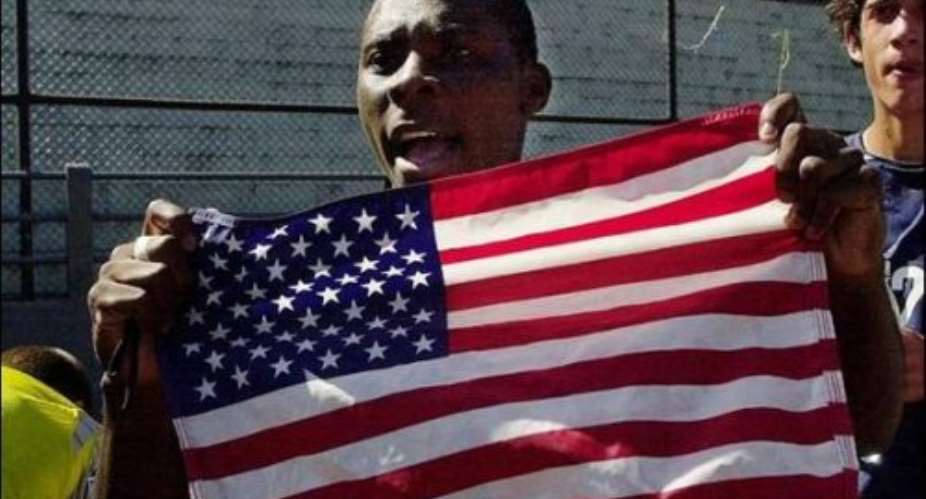In a sense, it is unfortunate that Freddy Adu is being celebrated as the new superstar of American soccer. For just a few months ago, he wasn't American at all.
He was still Ghanaian, a son of the African country Ghana, that is so proud to be the first below the Sahara to shake off the shackles of European colonialism and declare its independence. Ghana is where Freddy should be starring on the international stage.
Instead, Freddy is the talk of the under-17 U.S. team that is participating this week in the Dallas Cup. He is 13.
He is not exactly another Landon Donovan or DaMarcus Beasley or Eddie Johnson, U.S.-born-and-bred talents. He can't be American soccer's Pele, as some have suggested. Maybe he could be its Hakeem Olajuwon equivalent.
He is part American soccer present, part American soccer product.
Freddy is emblematic of one reason developing countries find footing in the World Cup so uncertain. As the popularity and economics of soccer have expanded, so too has the search for talent. It has pushed more and more scouts into Africa and South America looking for kids, adolescents even, to turn into players. Some even lose their right to play for their birth country's national team if they suit up for another country's national team beforehand.
The scouts offer more money than the talent they've identified can imagine. The scouts send the youngsters to farm clubs in places such as Belgium and France. If the kids don't pan out, and most of them don't, they wind up on the streets with nothing more than a bad memory. It happened to another Ghanaian prodigy, Nii Lampteh, about a decade ago. He flamed out in Europe after becoming an under-17 MVP.
Soccer's greatest ever, Brazil's Pele, calls the whole thing "the slave trade." Freddy very well may have been on that conveyor belt headed to who-knows-where if not for a little bit of luck that landed him in U.S. Soccer's developmental program. How lucky is U.S. Soccer for this, too?
Freddy's mother, Emelia, entered and won one of those occasional green-card lotteries the U.S. government holds in search for immigrants it might like. Freddy's mom said she tried her luck in order to get the best possible education for her two sons.
The Adus moved to the Washington D.C. suburb Potomac, Md., in 1997. Freddy was eight, the oldest boy by two years.
In his native Tema, Ghana, he'd only played around with a soccer ball in the street. In suburban Washington, soccer dads took note. By 10 or 11, he was in Europe with a club team, playing so spectacularly that he attracted those scouts, including one who offered a six-figure contract from an Italian club.
But Freddy's mom turned down that potential ticket to fortune. Instead, she opted for U.S. Soccer's development program based in Bradenton, Fla. Half the day is school; half the day is soccer. In a short time, it has produced not only good players such as Donovan, but soccer players with high school and college diplomas that won't fall flat on their faces if making a living at soccer doesn't work out. Freddy is in an accelerated program and is on pace to earn his high school diploma next May at age 14. He could also graduate to the MLS then, or chance the European leagues, becoming a 14-year-old pro. LeBron who?
Most everyone expects Freddy, whose birthday is June 2, 1989, to make the next U.S. World Cup team in 2006, being as young as Pele, 17, during Pele's World Cup debut. Freddy is that good.
He is so good that U.S. Soccer even helped his family gain U.S. citizenship.
"His mother was in queue the last year or so," U.S. Soccer spokesman Jim Moorhouse said. "So it was going to happen."
It came through a couple of months ago, just in time for Freddy to officially join the under-17 team as it enters world championship play.
"He's an anomaly," Moorhouse admitted of Freddy. "He does skew it [U.S. Soccer's success at developing players]. But he's in a program that has shown over the last 10 years that it works."
It works even if the kid doesn't wind up booting a soccer ball for a living. Europe's soccer keepers owe their talents of tomorrow just as much.





 We’ll no longer tolerate your empty, unwarranted attacks – TUC blasts Prof Adei
We’ll no longer tolerate your empty, unwarranted attacks – TUC blasts Prof Adei
 Bawumia donates GHc200,000 to support Madina fire victims
Bawumia donates GHc200,000 to support Madina fire victims
 IMF to disburse US$360million third tranche to Ghana without creditors MoU
IMF to disburse US$360million third tranche to Ghana without creditors MoU
 Truck owner share insights into train collision incident
Truck owner share insights into train collision incident
 Paramount chief of Bassare Traditional Area passes on
Paramount chief of Bassare Traditional Area passes on
 Two teachers in court over alleged illegal possession of BECE papers
Two teachers in court over alleged illegal possession of BECE papers
 Sunyani: Victim allegedly shot by traditional warriors appeals for justice
Sunyani: Victim allegedly shot by traditional warriors appeals for justice
 Mahama vows to scrap teacher licensure exams, review Free SHS policy
Mahama vows to scrap teacher licensure exams, review Free SHS policy
 Government will replace burnt Madina shops with a new three-story, 120-store fac...
Government will replace burnt Madina shops with a new three-story, 120-store fac...
